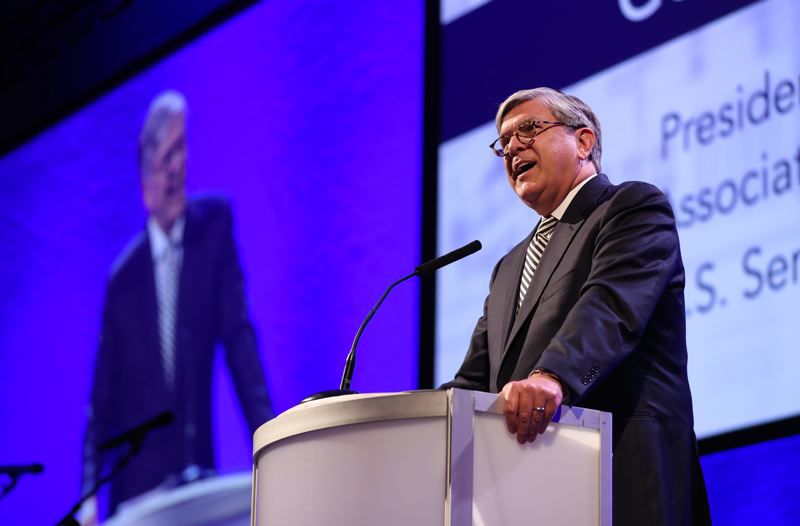Gordon Smith: Trump is wrong about news media as ‘the enemy of the American people’
Published 8:00 am Tuesday, May 2, 2017

- PAMPLIN MEDIA GROUP - Former Oregon U.S. Sen. Gordon Smith, the president of the National Association of Broadcasters, said Tuesday that President Trump is wrong to brand the media the enemy of the people. He made his remarks Tuesday at the annual meeting of the Portland Business Alliance.
Gordon Smith says President Donald Trump is wrong when he branded some news organizations as “the enemy of the American people,” a phrase usually describing hostile nations or subversive groups.
Smith made his comment Tuesday (May 2) during a keynote speech at the 17th annual breakfast of the Portland Business Alliance. More than 1,000 attended the event at the Oregon Convention Center.
“Of all of President Trump’s tweets, the one I think that is most regrettable is the one where he said the media is the enemy of the American people,” Smith said. “It is not.”
Coming from the president and chief executive of the National Association of Broadcasters since 2009, Smith’s comment is hardly surprising.
Coming from a former Republican state senator, Oregon Senate president and one of Oregon’s U.S. senators for 12 years until 2008, Smith’s comment may be surprising.
Trump’s original tweet Feb. 17 listed CNN and NBC, along with The New York Times, as “fake news media” that constitute the enemy. Later, a revised tweet added ABC and CBS.
Smith also quoted Leslie Moonves, the CBS chairman, as saying Trump has been good for television despite Trump’s attacks. Trump’s new chairman of the Federal Communications Commission is expected to pursue more deregulation.
In his current role, Smith said he has come to appreciate the constitutional guarantees of freedom of speech and the press contained in the First Amendment.
Despite technological challenges posed by the proliferation of new platforms and information sources, Smith said, “broadcast journalism becomes more important as our friends in the newspaper business continue to struggle in the digital age.”
Unlike his early years out of the Senate, Smith said, “I am never asked any more: Do I miss it? I am asked only one question: Are you glad you are not there?” as the audience laughed.
Cautious comments
As leader of an influential interest group on Capitol Hill who must deal with people from both parties, Smith was cautious about his observations of the current Washington, D.C., scene. For the first time since Smith was still a senator, there is a Republican in the White House and GOP majorities in Congress.
“You can distill it down to its essence: This was a ‘change’ election, and the demand for change was greater than the risk of electing Donald Trump,” he said.
But he said Trump, like all presidents, face institutional constraints such as Congress and the courts — and economic and international developments that presidents have little control over.
“They run as though they are running for king,” said Smith, whose father was an assistant agriculture secretary under President Dwight Eisenhower in the 1950s.
“They promise things they do not have the power to do. While presidents change, our constitutional architecture does not. So the presidency is an office that is always designed to disappoint.
“Our fathers blessed us with a government that was designed to be inefficient — and by the way, they are succeeding at it.”
Smith also said partisan gridlock in Congress has worsened since he was in the Senate from 1996 through 2008.
In February 2006, a National Journal analysis placed Smith dead center in ideology among senators. Today, by most measures, the most conservative Democrat is still to the left of the most liberal Republican.
Smith said Congress now acts only in a national emergency, when both political parties feel pressured to do so, “or when the essentials have to be done to avert a government shutdown — but the big issues seem incapable of resolution.”
Personal changes
Smith won the open Senate seat vacated by Republican Mark Hatfield in 1996, after he lost a close race earlier in the year to Democrat Ron Wyden for the open seat vacated by the resignation under pressure of Republican Bob Packwood.
He won re-election in 2002 but lost a close race in 2008 to Democrat Jeff Merkley, who still holds the seat.
“I certainly miss the people, I miss all of you, and I miss the importance of the issues that were before us,” he said. “But I don’t miss much of the dysfunction that was beginning to grip the city.”
He became president of the broadcasters’ group in 2009.
Smith was introduced by his former state director, Kerry Tymchuk, now executive director of the Oregon Historical Society.
Smith, who turns 65 later in May, stopped in Pendleton the previous day to visit Smith Frozen Foods, which remains a family company in nearby Weston.
Since 2012 he has had a leadership position in the Church of Jesus Christ of Latter-day Saints.
He and his wife, Sharon, will soon observe their 43rd wedding anniversary. They have six grandchildren split among two daughters and a foster child they raised.
pwong@pamplinmedia.com
twitter.com/capitolwong





